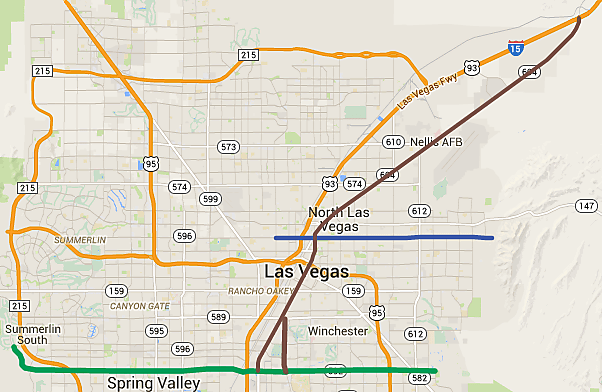The regulations that govern taxis in the Las Vegas area impose especially heavy restrictions on consumer choice and driver availability. Such an environment is ideal for rideshare companies, which provide consumers with more choice and drivers with more flexibility. Yet perhaps unsurprisingly, regulators and market incumbents in Sin City may prove to be among ridesharing companies’ most defensive and rigid opponents.
Taxi drivers in Las Vegas are not only restricted in regards to where they can pick up passengers, they are also restricted in how they pick up passengers. For instance, individuals are unable to hail Las Vegas cabs from the street. Cabs must be called and requested or found at designated areas.
The Nevada Taxicab Authority has a web page dedicated to describing the sixteen different taxi medallions available in the state.
The “North Las Vegas” medallion allows operators to drive 24 hours a day, seven days a week. Holders of this medallion “are permitted to stage on any taxicab stand North of Owens Avenue. They can then provide an on-call service within a five-mile radius of North Las Vegas. The southern border of North Las Vegas is Flamingo Road. Taxis with the “North Las Vegas” medallion may pick up passengers when directed to do so by a dispatcher; however the ride must originate north of Flamingo Road and cannot originate on Las Vegas Boulevard or Paradise Road (in the map below Owens Avenue is blue, Flamingo Road is green, and Las Vegas Boulevard and Paradise Road are highlighted in brown).
“Providing that adequate service is maintained” in North Las Vegas, taxis with this medallion are permitted to provide service from ten specified locations, most of which are hotels.
The restrictions detailed above affect cabs with only one of the Las Vegas area taxi medallions. Other taxi medallions restrict where drivers can pick up passengers (including a ban on picking up passengers from McCarran International Airport) as well as when drivers can provide rides (such as a prohibition on picking up passengers after 2am).
Uber and Lyft allow their rideshare drivers to pick up whom they want, where they want, when they want. Las Vegas taxi drivers are allowed no such flexibility. So if Uber, Lyft, and other rideshare companies were to move into Las Vegas, it wouldn’t be surprising if the effect on the taxi industry were similar to what was seen in San Francisco.
In an article published in Forbes on Sunday, Teamly CEO Scott Allison highlighted reporting on Uber’s recent meeting with prospective Las Vegas drivers. Last summer, the Nevada Transportation Authority suggested it would impound unlicensed vehicles providing rides for hire. Allison also highlighted that as it stands Nevada legislation effectively prohibits Uber and similar companies from operating in the state.
Las Vegas, which has a huge tourist and convention industry and a far-from-ideal public transport system, is ripe for ridesharing. Unfortunately, Uber, Lyft, and other ridesharing companies should expect strong opposition from regulators and taxi companies if they launch there.

